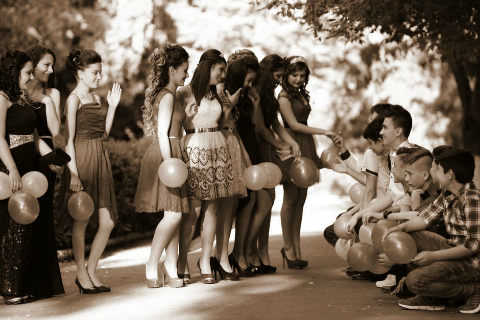|
Bolivian Customs: Social Etiquette Consider brushing up on social etiquette before traveling to Bolivia. Whether you are traveling as a tourist, coming here to do business, or planning to live here, learning about Bolivian culture will be very important to ensuring the success of your time here and how much you enjoy your trip. Bolivians are very friendly toward foreigners, but can be quickly become less welcoming when bad manners are displayed. Bolivians don't expect foreigners to know everything about their culture, but making a little effort goes a long way and you're more likely to enjoy their hospitality if you do.
Social Customs in Bolivian Culture
• Bolivians don’t have the same concept of personal space as in other countries. Typically people will stand very closely to you and if you back away will think you are being rude or that you’ve been offended by something they’ve said. • Bolivians also touch and gesture much more than in other countries. While they’re talking to you they may pat you on the back, touch your arm, or lean toward you. • Bolivians typically speak softly and are bothered when a uniform degree of sound is not maintained. When in public, on a bus, in a restaurant, etc. you should take your cue from those around you in terms of how loudly you can speak or laugh. In general, try not to stand out above the rest in volume or when you laugh or gesture. • On the other hand, in some situations, such as as bars or discoteques, Bolivians can be very loud and racocious. In Eastern Bolivia, such as Santa Cruz, people tend to be much more relaxed and informal socially than in the Andean region. • Be aware of the social and cultural backgrounds of the people you are with. While in general social etiquette tends to follow that of Western Europe, there are large Japanese, Lebanese, German and other groups in Bolivia, many of whom continue to uphold the traditions of their ancestors, so learn about the people you will be spending time with and research their social etiquette as well. • When greeting, it is customary to shake hands with your right hand. In social situations, not so much with business introductions, when you are introduced to someone or are greeting someone you are also expected to lean to your left as you clasp their hand and kiss them on the cheek. Women kiss women and men kiss women, but men do not kiss men. • Maintain eye contact at all times. Looking away or around while you talk to someone or while they talk to you is considered rude and gives the other person the impression that what they are saying is not important to you. • If you are seated when someone comes over to greet you, stand up for the greeting. Don’t make people lean down toward you. • If a woman enters the room, stand up and don’t sit down again until she does. It is customary for men to offer their seats to women and the elderly, but not to children. Children are expected to sit on their parents’ laps or on the floor next to them if there are not empty seats for them. Never sit on the arm of a chair. Never put your feet up on anyone’s furniture. • Never take your shoes off at anyone’s home unless they invite you to do so, or unless you plan to swim in their pool. • When someone enters your house you should immediately offer to take their coat. Draping your coat over someone’s furniture is not good social etiquette. Preferably, if they don’t offer to take your coat, keep it on your lap or hold it until they realize they’ve forgotten to take your coat. • If you visit someone’s house, it is not good social etiquette to enter their bedroom. If they give you a tour of the house, only enter the bedrooms if invited to do so. Otherwise, just peek into the room from the doorway. • Always introduce people using their professional titles along with their names, and always begin with the formal form of YOU, which in Spanish is USTED. Do not switch to the informal form (TÚ) until they do so first. • Be aware of your posture. Sitting in a slumped position is considered rude. Likewise, if you are a woman, sitting with your legs open is considered slutty.
• At certain events, the expected attire can be surprisingly formal. These include adult birthday parties, quinceañeras (a girl's 15th birthday party complete with ladies in waiting similar to a wedding in both attire and cost), Mother's Day, baby showers or christenings, etc. as well as dinners out before a formal function (such as a high society opera or art show etc.), school dances (not just prom) and others, and in some cases these include the use of full length ball gowns. • Always ask what attire is expected at both social and business events. Showing up in incorrect attire is a disaster. In the Andean region of the country people dress much more conservatively. In Santa Cruz the attire is more relaxed and colorful, due to the climate. Also, Santa Cruz is Bolivia’s fashion and modeling city. You’ll notice women wear very short skirts. However, they do not wear shorts in public. Dressing scantily and dressing in shabby clothing is not the same thing. Never wear wrinkled, ripped or messy clothing in public. • At nighttime dress is more formal, especially if you plan to dine out or go to a bar or discotheque. People dress up and accessorize highly to go out. If you wear flip-flops, tennis shoes, or inappropriate clothing you could be denied entry to discotheques and other places. Don’t dress like you’re on spring break in Cancún. It’s not acceptable here. • Be aware that smoking indoors is not against the law in Bolivia and people quite often smoke in restaurants, bars, discos, etc.. Asking them not to smoke is considered rude and imposing. If you are a smoker, do not smoke unless your host smokes too, and if you smoke, always offer cigarettes to all the people around you. It is rude to smoke without offering to share with everyone else. • It is rude to stare and even more rude to point. When you want to point out someone or something, typically you nod your head in their (or its) direction. • Women are considered subordinate to men in many places of Bolivia (more so in the Andean areas and less so in Santa Cruz where women are more demanding of respect). If a man verbally or physically mistreats his wife or companion in your presence, it is considered rude to interfere or stand up for her. People don’t get involved in others’ domestic disputes. If you stand up for her, SHE may get angry with you and tell you to buzz off.
• You don’t have to like them, or agree with them, but you should respect Bolivian social customs and practice social etiquette. It’s OK to voice your opinion about certain aspects of social etiquette among very close friends, but you should do so in the form of inquiries rather than complaints or judgments. It will allow your host or friend to feel you are curious and asking about them, rather than judging them. And usually they will be happy to oblige with an explanation. • If you give a gift, the recipient will not open it in front of you. Neither should you open a gift given you right away. It is customary to wait until the giver has left to do so. The exception would be when the gift is a beverage or type of food, cigars, music, etc. to share the gift with the giver, if the event you're at is appropriate. Refusing a gift is bad social etiquette. Accept it and be gracious about it. • If you are sitting between or beside people, never turn your back on someone in order to pay attention to what another is saying. It is considered very bad social etiquette, even a snub if you will to “dar la espalda” (turn your back on someone). If it is absolutely necessary for some reason, before you turn your back on someone you should say “Disculpe si le doy la espalda un momento” (“Forgive me for turning my back on you for a moment”). This will let them know you are aware of them, are not snubbing them, and have no intention of being rude.     |


